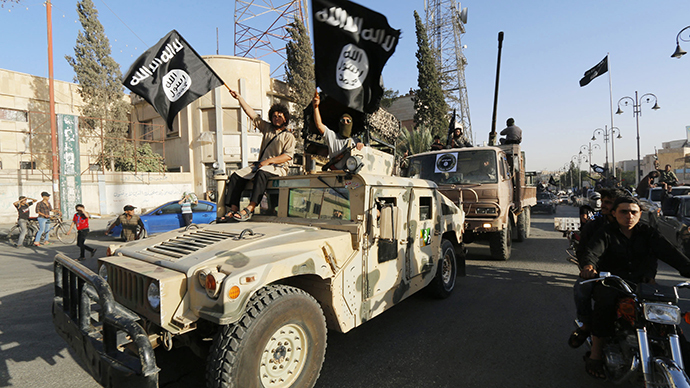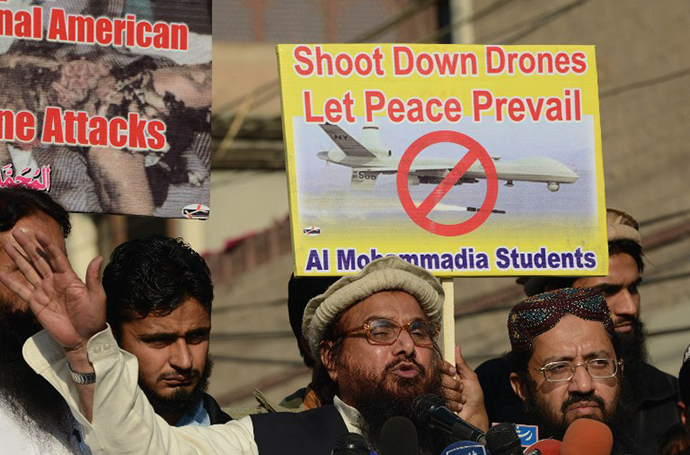US fear-mongering over ISIS ignores America’s border problem

On the 13th anniversary of 9/11, a survey showed that 47 percent of Americans – about 150 million citizens - feel less safe today than they did before the terrorist attacks on the World Trade Center and the Pentagon (NBC/Wall Street Journal survey).
That's an increase of 19 percentage points from just last year.
That’s certainly a lot of fear and trembling in the “home of
the brave,” as Francis Scott Key described America in 1812.
It should come as no surprise that the main culprit for this
flood of anxiety is not the flood of illegal aliens pouring into
the US from south of the border, but rather an Islamic bogeyman
upstart, which calls itself ISIS (the Islamic State of Iraq and
Syria, or Islamic State). This terrorist group, which appeared as
suddenly and mysteriously as a sandstorm in the desert, is
apparently so ruthless that even battle-hardened Al-Qaeda
politely disassociated itself from these (literally) cutthroat
individuals.
ISIS, with its barbaric, take-no-prisoner tactics of beheading
Christian babies and Western journalists with equanimity, has
taken the Rumsfeldian rule of ‘shock and awe’ to a whole new
level. Undoubtedly, this dangerous new wave of fanatical
fundamentalism, which aims to create an Islamic caliphate across
a sword’s swath of the Middle East, deserves the undue attention
of the United States, as well as any country concerned with
global security.
However, to echo the sentiments of former US presidential
candidate Ron Paul, the hugely popular 12-term Senator from Texas
who is regularly shunned by the US media (with the exception of
political satirist John Stewart), the seemingly
intractable problems plaguing the Middle East are at least
partially due to the American military being stubbornly
entrenched there in the first place.
Although many of the problems now plaguing the Middle East
occurred during the two-term presidency of Barack Obama’s hawkish
predecessor, George W. Bush, including the disastrous invasion of
Iraq, America’s first black president is also responsible for
many of the problems.
Since Obama’s inauguration in 2009, the Pentagon has launched 330
strikes on Pakistan alone, while George W. Bush conducted just 51
such strikes in four years. Meanwhile, the covert drone campaign
continues without congressional oversight in dangerous,
unpredictable places like Yemen and Somalia.

According to the Bureau of Investigative Journalism (TBIJ), these strikes have killed more than 2,400 people, at least 273 of them reportedly civilians. In fact, just one week after Obama was awkwardly awarded the Nobel Peace Prize (December 17, 2009), a US Navy submarine launched a cruise missile at a suspected militant camp in southern Yemen, killing dozens of innocent civilians.
The long-term consequences of such reckless tactics will undoubtedly come back to haunt Americans in the future; after all, it’s anybody’s guess how many new terrorists such unspeakable acts have created. Yet today Obama seems undaunted by America’s wariness, announcing in his presidential address that the US military “will hunt down terrorists who threaten our country, wherever they are."
I am very curious about that statement, which only lacks George Bush’s dire warning “you are either with us or against us” from the Neocon foreign policy playbook. Does that mean if an ISIS group appears in central London, for example, US drones will quickly and surgically obliterate them – without the permission of the UK government? Somehow I seriously doubt that will be the case.
The implications of such a strategy, judging by Washington’s single-minded obsessiveness with removing Syrian President Bashir Assad from power, were not lost on Moscow. If the West conducts aerial strikes on ISIS militants in Syria without consulting Damascus, the alliance may use the occasion to attack President Bashar Assad’s forces, Russian Foreign Minister Sergey Lavrov warned this week.
“There are reasons to suspect that airstrikes on Syrian territory may target not only areas controlled by Islamic State militants, but the government troops may also be attacked on the quiet to weaken the positions of Bashar Assad’s army,” Lavrov told reporters in Moscow.
Such a development would lead to a huge escalation of conflict in the Middle East and North Africa, he added.
It does not take a survey to understand that none of these developments has made the American people feel any safer. After all, as the US mainstream media continues to paint ISIS as an evil force hell-bent on attacking Americans – even on US soil – the domestic policy of both the Democrats and Republicans, now practically indistinguishable, seems oblivious to the modern realities. Indeed, despite the media ringing the alarm over terrorism and ISIS, the threat of terrorism actually ranks very low on the list of things that are making Americans nervous.
Q. Which is more important to you in your vote for Congress this November––domestic issues such as the economy, health care, and immigration, or international issues such as Iraq, Russia, and terrorism?
Domestic issues__64
International issues__22
Both equally important (VOL)__13
Not sure__1
According to the results of the following poll question by NBC/Wall Street Journal (below), Americans are much more concerned with domestic issues.
It needs to be emphasized that the NBC/WSJ poll says absolutely nothing about ‘homegrown’ events that may be responsible for increasing the domestic fear factor, including our very own National Security Agency, which, thanks to whistleblower Edward Snowden, was shown to be conducting a massive surveillance campaign against the American people.
At the same time, the Obama administration continues to ignore
the gaping hole along the US-Mexico border, which is sending an
invitation to thousands of illegals from South America that the
United States will welcome them with open arms.
And in fact that is exactly what is happening. Once across the
border, busloads of these illegals are being taken on joyrides to
cities around the country, provided with gratuitous food and
lodging, and placing a heavy burden on state and federal budgets.
What other country, apart from those committed to a national
breakdown, would tolerate such a situation?

Would it not seem much more logical and effective, especially
given the stated intention of ISIS to carry out an attack on
American soil, for the United States to redirect some of its
military hardware to the Mexican border to thwart any possible
breach? Perhaps even redeploy (and disarm) those drones now
firing on innocent Muslims in the Middle East to patrol the
border?
After all, it may only take one fundamentalist to breach our
borders to create a lot of havoc in the Homeland. The real
problem making Americans nervous today is not in Iraq or Syria,
or the outrageous activities of ISIS, but increasingly from south
of the American border.
Robert Bridge is the author of the book,Midnight in the American Empire,which examines the consequences of extreme corporate power in the United States.
The statements, views and opinions expressed in this column are solely those of the author and do not necessarily represent those of RT.
The statements, views and opinions expressed in this column are solely those of the author and do not necessarily represent those of RT.













